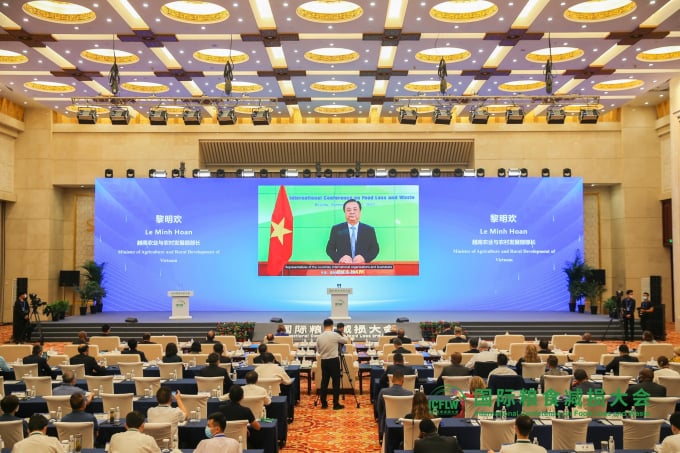November 24, 2025 | 11:13 GMT +7
November 24, 2025 | 11:13 GMT +7
Hotline: 0913.378.918
November 24, 2025 | 11:13 GMT +7
Hotline: 0913.378.918

Resources for agricultural production are getting scarcer, particularly severe negative impacts of climate change, which poses great challenges especially in the context of complicated developments of the COVID-19 pandemic.
Reducing food loss and waste is not only an economic and environmental concern but also an imperative morality. The Food Security and Nutrition Report 2020 of the Food and Agriculture Organization of the United Nations (FAO) shows that around 690 million people in the world are still suffering from starvation, about 2 billion facing food shortage and malnutrition, and 144 million children under 5 years of age are malnourished.
Vietnam always accompanies the international community to achieve the United Nations Sustainable Development Goal (SDG) of halving food loss and waste by 2030, highly appreciates China's initiatives to reduce food loss and waste, including the “Clean Your Plate” campaign started in 2013 to minimize lavish parties and receptions.
In particular, the Law on Anti-Food Waste of China issued in April 2021 set the legal basis to establish a basic code of conduct and build a lasting mechanism, in order to prevent food waste and at the same time to encourage communities, people to create sensible and healthy eating habits.
Being one of the economic pillars, Viet Nam’s agricultural sector has played an important role in ensuring food security for nearly 100 million people, stabilizing livelihoods for over 60% of the population still living in rural areas, contributing to socio-economic development. In 2020, despite being heavily affected by the COVID-19 pandemic, Viet Nam's agricultural, forestry and fishery export turnover reached $41.53 billion, contributed to nearly 15% GDP of the country.
The Government of Viet Nam highly considers the need for close coordination among countries to gradually create positive changes and reduce food loss and waste. Vietnam was the first country in Southeast Asia to commit and implement the National Action Plan for Zero Hunger by 2025, which included the national target of “zero food loss and waste". In addition, Vietnam is committed to continuing the direction of low-carbon agriculture and sustainable growth.
To contribute to the national target of reducing food loss and waste, the Vietnam Ministry of Agriculture and Rural Development of Vietnam set some priorities as follows:
Revising the policies to promote high-tech agriculture, accelerate the rate of mechanization and in-depth processing, increase added value and reduce food loss and waste;
Promoting national and international innovation networks towards green transformation of the economy and building a low-carbon food system; step-by-step applying precise technology in agriculture, approach of ecology, circular economy; integrating the application of science and advanced technology to process and utilize agricultural by-products effectively;
Encouraging digital transformation, digital development in agriculture and logistics services to improve the capacity of food distribution and to reduce food loss. Encouraging and supporting people and businesses to get on skills in application of e-commerce and online business...
"Reducing food loss and waste needs to be targeted to green recovery, ensuring food security and nutrition to adapt to the “new normal”. Vietnam highly appreciates China's initiatives and efforts and is committed to accompanying the international community in the development process, sustainable development of food systems, contributing to the response to climate change and for the achievement of the Sustainable Development Goals (SDGs) by 2030", said Minister Le Minh Hoan
Translated by Linh Linh

(VAN) The agricultural sector is finalizing the strategic framework for emission reduction, setting the goal of sharply cutting methane and 403.7 million tons of CO2 equivalent and moving toward Net Zero by 2050.
/2025/11/22/2236-1-153832_483.jpg)
(VAN) The National Marine Spatial Planning is opening up opportunities for sustainable blue sea development across 21 coastal localities.

(VAN) Viet Nam’s forestry sector is undergoing a comprehensive transformation, strengthening management, protection, and development efforts to maintain ecological security and drive green, sustainable growth.

(VAN) Viet Nam is accelerating efforts to digitize reservoir operations, from real-time data to hydraulic modelling.
/2025/11/21/3348-2-102623_454.jpg)
(VAN) National Assembly delegate Nguyen Thi Lan has proposed adding special mechanisms to attract human resources to the agricultural, forestry, and fishery sectors, addressing the shortage of high-quality personnel.

(VAN) Over the past two decades, the unified legal framework for water resource management has been perfected, becoming a crucial foundation for ensuring national water security.

(VAN) The land-data cleansing campaign in Dien Bien is entering its final stretch, yet weak infrastructure, limited personnel and fragmented multi-period datasets continue to create major obstacles.